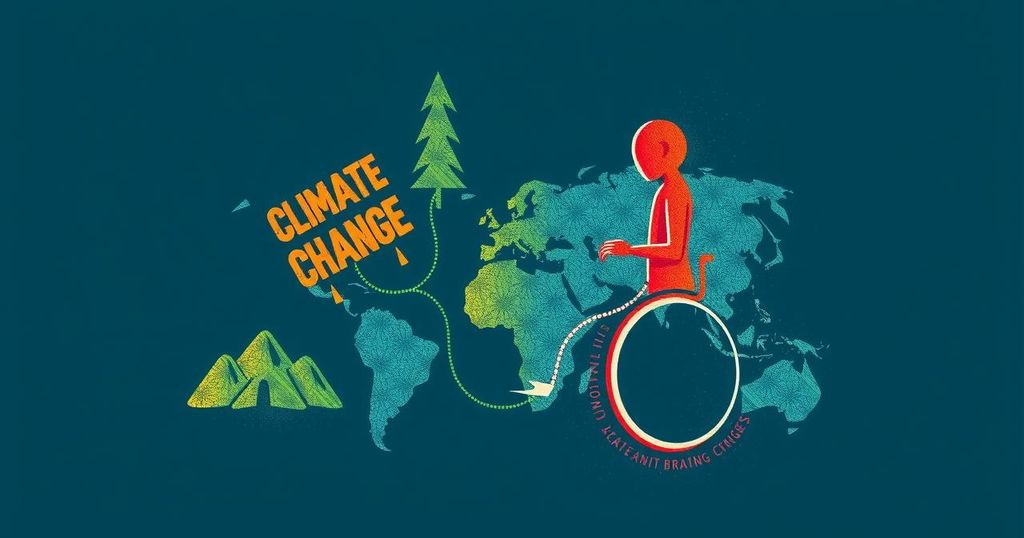Persons with disabilities are disproportionately affected by climate change, facing unique challenges during environmental emergencies that risk their health and survival. Advocacy for their representation in climate policy dialogues is essential, as existing systems often overlook their specific needs. Initiatives led by individuals like Amina Audu highlight the importance of empowerment and inclusion in combating climate issues, underscoring a collective call for recognizing the rights and contributions of persons with disabilities.
The impact of climate change disproportionately affects individuals with disabilities, rendering their experience during climate crises particularly severe. Consider a hypothetical scenario where a person with a mobility impairment faces a hurricane or an individual with visual impairments encounters extreme flooding. Such circumstances highlight how environmental emergencies exacerbate existing vulnerabilities among over 1.3 billion people globally who live with disabilities. Amina Audu, a Nigerian disability advocate, emphasizes that this demographic constitutes the largest minority group worldwide, with a considerable portion living in regions of the global south, thus facing heightened risks from environmental events.
Persons with disabilities frequently encounter additional hardships during climate emergencies, such as disruptions to access vital medical care and assistive technologies. They are two to four times more likely to perish in these situations compared to able-bodied counterparts. Chronic conditions common among this group, including asthma and diabetes, render them especially sensitive to environmental stresses like heat and poor air quality. Australian medical expert Dr. Kimberly Humphrey points out that certain medications exacerbate heat sensitivity, leading to detrimental health impacts, including heat-related illnesses.
Despite their heightened vulnerability, individuals with disabilities frequently lack representation in climate policy discussions, thus limiting their input in critical decision-making processes. Amina asserts the necessity for formal inclusion in international dialogues, such as the United Nations Framework Convention on Climate Change (UNFCCC) meetings. Establishing a dedicated disability constituency is vital for integrating diverse perspectives into climate policies.
Grassroots initiatives led by advocates like Amina are essential in addressing these inequities. Her organization, Rebuilding Hope on Wheels Initiatives, focuses on empowering individuals with disabilities to contribute to climate adaptation strategies. Collaborating with healthcare professionals like Professor Adesola Odole, they assess climate change’s impact in Nigeria and promote educational efforts in physical therapy curricula to create a future generation of informed advocates.
The rallying cry “Nothing Without Us” encapsulates the demand for full participation of persons with disabilities in climate discussions. As the Global Disabilities Summit approaches in Berlin in 2025, the emphasis will be placed on inclusive development, particularly in the global south. Amina articulates the necessity for disability rights to be recognized beyond mere acknowledgment, urging significant engagement in shaping climate policies.
The intersection of climate change and disability highlights the unique vulnerabilities faced by individuals with disabilities during environmental crises. With over 1.3 billion people worldwide living with disabilities, this community represents the largest minority group, significantly impacted by climate change. Many individuals with disabilities reside in the global south, where the likelihood of severe climate events is greater. Consequently, their health, mobility, and access to essential services are jeopardized during such emergencies. Limited representation in policy discussions exacerbates these challenges, necessitating a call for greater inclusivity and advocacy within climate action frameworks.
In summary, the relationship between disability and climate change underscores the urgency of recognizing and integrating the voices of individuals with disabilities into environmental policies and discussions. Their experiences and insights are crucial for developing equitable responses to climate crises. Advocacy efforts, such as those led by Amina Audu and Professor Adesola Odole, are pivotal in fostering inclusive approaches and ensuring the rights of persons with disabilities are upheld within the broader context of climate action. Moving forward, it is imperative that the global community prioritizes the inclusion of this demographic in all climate-related conversations to promote sustainable and equitable solutions for all.
Original Source: www.globalcitizen.org






